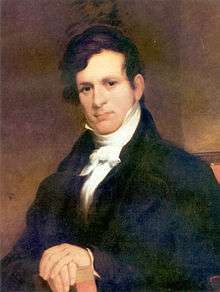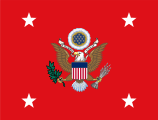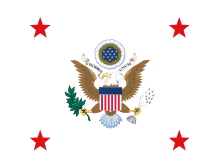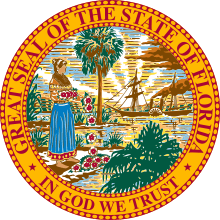John Eaton (politician)
| John Henry Eaton | |
|---|---|
 | |
| United States Minister to Spain | |
|
In office March 16, 1836 – May 1, 1840 | |
| President | Andrew Jackson |
| Preceded by | William T. Barry |
| Succeeded by | Aaron Vail |
| Governor of the Territory of Florida | |
|
In office April 24, 1834 – March 16, 1836 | |
| President | Andrew Jackson |
| Preceded by | William Pope Duval |
| Succeeded by | Richard K. Call |
| 13th United States Secretary of War | |
|
In office March 9, 1829 – June 18, 1831 | |
| President | Andrew Jackson |
| Preceded by | Peter Buell Porter |
| Succeeded by | Lewis Cass |
| United States Senator from Tennessee | |
|
In office September 5, 1818 – March 9, 1829 | |
| Preceded by | George W. Campbell |
| Succeeded by | Felix Grundy |
| Personal details | |
| Born |
June 18, 1790 Scotland Neck, North Carolina, U.S. |
| Died |
November 17, 1856 (aged 66) Washington, D.C., U.S. |
| Political party |
Democratic-Republican (1815–28) Democratic (1828–40) |
| Spouse(s) |
Myra Lewis (m. 1810–18); her death Margaret O'Neill (m. 1829–56); his death |
| Alma mater | University of North Carolina at Chapel Hill |
| Profession | Lawyer, soldier |
| Military service | |
| Service/branch | United States Army |
| Battles/wars | War of 1812 |
John Henry Eaton (June 18, 1790 – November 17, 1856) was an American politician and diplomat from Tennessee who served as U.S. Senator and as Secretary of War in the administration of Andrew Jackson. He was 28 years old when he entered the Senate, making him the second-youngest U.S. Senator in history after Armistead Thomson Mason. Eaton resigned as Secretary of War as part of a strategy to resolve the Petticoat affair, a social scandal that involved Eaton and his wife, Peggy, and hindered the effectiveness of the Jackson administration..
Early life
John Eaton was born on June 18, 1790 near Scotland Neck, Halifax County, North Carolina. He graduated from University of North Carolina at Chapel Hill.
Career
After graduating from the University of North Carolina, he became a lawyer and a member of the Democratic Party. He served in the U.S. Army during the War of 1812.
Public service
From 1815 to 1816, he was a member of the Tennessee House of Representatives. In 1818, he was elected Senator from Tennessee, serving until 1829. His age of 28 at the time of his entry to the Senate was notable; it contradicted the US Constitution's requirement that all Senators be over the age of 30.
Eaton was a close personal friend of Andrew Jackson. After Jackson became President, Eaton and Amos Kendall, who served as Postmaster General in Jackson's second term, were part of his informal circle of advisors; Jackson detractors called them his "Kitchen Cabinet". (Apparently this group did, in fact, frequently meet in the White House kitchen.)
Petticoat affair
Eaton resigned his Senate seat in 1829 to accept appointment as Jackson's Secretary of War, and served from 1829 to 1831. Respectable women in Washington social circles led by Floride Calhoun, the wife of Vice President John C. Calhoun, snubbed the Eatons because they married soon after her husband, John B. Timberlake's, death, rather than waiting for the usual mourning period; there were rumors that they had been having an affair prior to her first husband's death. The disruption penetrated the Cabinet as wives and cabinet member ostracized the Eatons, which angered Jackson. The controversy, known as the Petticoat affair, contributed to the political rise of Martin Van Buren, a member of Jackson's cabinet who supported the Eatons.
After Van Buren resigned as Secretary of State to help Jackson resolve the controversy, Jackson was able to end it by asking for the resignations of most of his other cabinet members. Eaton resigned as Secretary of War on June 18, 1831, and later received appointments that took him away from Washington, DC, first as Governor of Florida Territory from 1834 to 1836, and then as ambassador to Spain from 1836 to 1840.
Personal life
His first wife was Myra Lewis, who died before 1818. Eaton married his second wife Peggy O'Neill Timberlake (1799–1879), a longtime friend and newly bereaved widow, in 1829, years after meeting her and her husband in Washington, DC.
Eaton, a Freemason, died in Washington, D.C. on November 17, 1856. He was buried at Oak Hill Cemetery, Washington, D.C.
Legacy
Eaton County, Michigan, is named in his honor.[1]
Notes
- ↑ Gannett, Henry (1905). The Origin of Certain Place Names in the United States. Govt. Print. Off. p. 113.
References
- United States Congress. "John Eaton (id: E000024)". Biographical Directory of the United States Congress.
- Youngest Senator in history - Senate.gov
External links
 "Eaton, John Henry". Appletons' Cyclopædia of American Biography. 1900.
"Eaton, John Henry". Appletons' Cyclopædia of American Biography. 1900. "Eaton, John Henry". New International Encyclopedia. 1905.
"Eaton, John Henry". New International Encyclopedia. 1905.- John Eaton at Find a Grave
| United States Senate | ||
|---|---|---|
| Preceded by George W. Campbell |
U.S. Senator (Class 1) from Tennessee 1818–1829 Served alongside: John Williams, Andrew Jackson, Hugh Lawson White |
Succeeded by Felix Grundy |
| Political offices | ||
| Preceded by Peter Buell Porter |
U.S. Secretary of War Served under: Andrew Jackson 1829–1831 |
Succeeded by Lewis Cass |
| Preceded by William P. Duval |
Territorial Governor of Florida 1834–1836 |
Succeeded by Richard K. Call |
| Diplomatic posts | ||
| Preceded by William T. Barry |
U.S. Minister to Spain 1836–1840 |
Succeeded by Aaron Vail |



